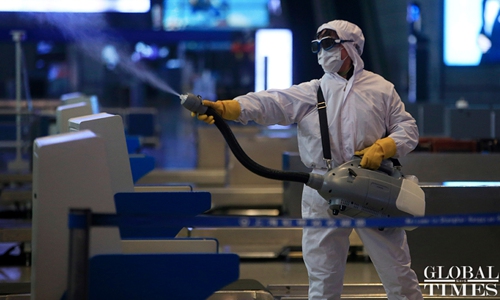HOME >> OPINION
Racism shows ugly side as China fights coronavirus
By Chen Hong Source:Global Times Published: 2020/1/31 18:20:43

Photo:GT
As people worldwide have joined together to combat the spread of the novel coronavirus, it is disturbing to see a resurgence in "yellow peril" mythology. Such hysteria is not only circulating on social media, but has also emerged in Western media outlets.
Each food culture has a culinary distinctiveness. It is true that some diners, Chinese and non-Chinese, prepare unorthodox dishes with recipes that include certain animals and plants, and in many cases are based on the delusion that exotic creatures have nourishing and medicinal qualities.
Such culinary traditions are gradually discouraged in China, and trading endangered wildlife is a criminal offense.
Since the epidemic originated from Wuhan, central China's Hubei Province and the virus was believed to come from a seafood market in the city, Chinese cuisine is being slandered for its alleged use of wildlife, thus rekindling the racist narrative that has been in the background of the Western subconscious mind.
Video footage of a Chinese woman holding a bat with her chopsticks over a soup bowl was later confirmed to be a clip from a travel promotional video filmed on the Pacific island of Palau where bat stew is a local traditional delicacy.
Another clip depicting the rampant bat trade market featured captions that said it was filmed in Wuhan but was actually shot in Sulawesi, Indonesia.
Bats and other exotic creatures are not menu items found at most Chinese restaurants, but this did not prevent a group of French teenagers from barging into a Chinese restaurant in Paris and making malicious inquiries about bat soup.
An Australian tabloid, the Herald Sun, featured the headline "Chinese virus PANDAMONIUM," while another, the Daily Telegraph, demanded, "China kids stay home" as the start of the new school year approaches. The Danish newspaper, Jyllands-Posten, blasphemed the Chinese national flag with coronavirus particles, triggering indignation of Chinese people worldwide. Although the Daily Telegraph issued an apology at its Letters section concerning its controversial headline, the deep-seated discrimination against Chinese still lingers.
Such racialization of the ongoing pandemic is against morality and humanity and should be refuted and condemned.
The dark pages of history included discriminatory portrayals of so-called uncivilised Third World civilizations from Asia, Africa and South America, and were described as having "barbarous, filthy and unhealthy" eating and living habits.
Such racist descriptions were not mere products of the Western misperception of the other cultures, but they were exploited and weaponized to justify Western colonization. Despite that the colonization era has long gone, misconceptions of non-Western cultures persist and discrimination is lurking and spreading quickly when issue breaks out.
Indeed, people everywhere in the world should be vigilant against such xenophobia, which can revive and incite racism. There are even more alarming signs that some forces have been taking advantage of such xenophobic thinking to stoke the "China threat" mentality.
Juanita Nathan, chair of the board of the York District School in Ontario, Canada and the school's education director Louise Sirisko warned against the risks of bias and racism toward students from China "in the name of safety" amidst speculations over the spread of the novel coronavirus based on race. Such sensibility is admired and applauded.
While we salute the self-sacrificing dedication and heroism of the medical professionals and citizens in Wuhan and elsewhere in China, the coronavirus outbreak will prompt Chinese health and law enforcement authorities to strengthen its crackdown on wildlife trade. Emergency public health responses will undergo major overhaul.
The public health emergency response is not only China's. The World Health Organization (WHO) Director-General Tedros Adhanom Ghebreyesus was correct in his recent comment about China's commitment to the principles of solidarity and cooperation with the world to combat the crisis. He stressed upon facts not fear, science not rumour, solidarity not stigma in the world's concerted struggle against the endemic.
Sensibility and partnership are essential for humanity to prevail and overcome this ongoing demonic plague.
The author is a professor from the East China Normal University. opinion@globaltimes.com.cn
Posted in: VIEWPOINT